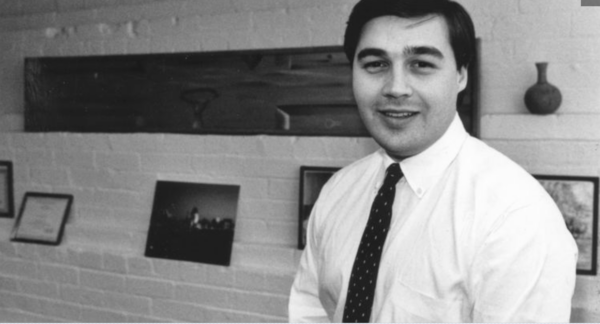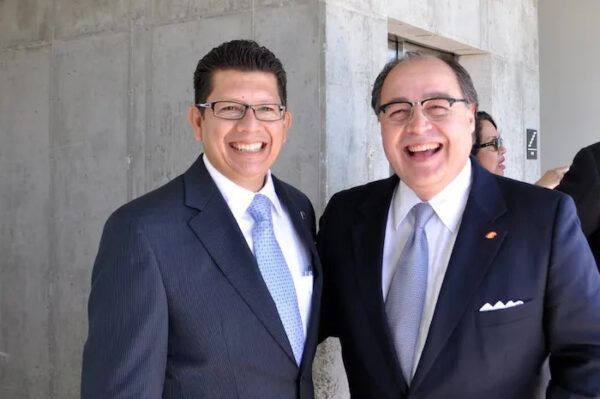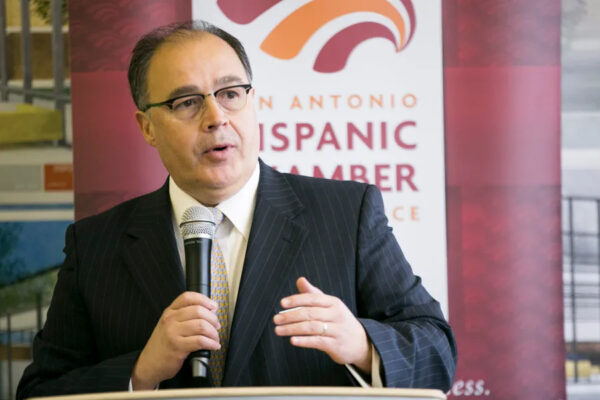Ramiro Cavazos is a proud seventh-generation Texan who has carved out a successful career as a business executive, public servant, and community leader. Now, he’s focused on finding—and empowering—the next generation of Hispanic American entrepreneurs.
As president and CEO of the United States Hispanic Chamber of Commerce (USHCC), America’s largest business advocacy organization for Latinos, Cavazos fights to get recognition for the Latino business community that serves as a true engine of the American economy. According to the USHCC, more than 5 million Latino-owned businesses contribute more than $800 billion to the American economy. Cavazos is determined to see that number go up. More importantly, he wants to ensure that Hispanic-owned businesses receive the credit they deserve, literally and figuratively.
“I just feel that we’ve been undervalued, under invested in, and taken for granted,” he told CSQ. “The facts show that we are 20% of the 332 million people living in this country. We contribute close to $3 trillion to the gross domestic product. We have 5 million Latino-owned businesses and close to 300 Latino chambers in the U.S. alone.”

Ramiro Cavazos at the San Antonio Hispanic Chamber of Commerce in 1989.
RISING THROUGH THE RANKS
Cavazos always has business on his mind and entrepreneurship flows through his blood. His grandparents on his father’s side owned a small grocery store, and his maternal grandparents were shrimpers in a small town called Palacios on the Gulf Coast, since well before Texas was part of the United States.
“They were natural entrepreneurs and connected to the soil and the land and had been here for a long time,”
Cavazos was born in the border city of McAllen, Texas, and grew up in nearby Weslaco, where his father spoke Spanish at home while his mother spoke English—not uncommon in Tejano culture. He did well in school and enrolled at the University of Texas at Austin, where he completed his bachelor’s degree in government in just three years.
Once out of school, Cavazos started his professional career working in city management for San Antonio and Helotes. He also served as a special assistant to former U.S. Senator (and vice presidential candidate) Lloyd Bentsen of Texas, as well as a researcher for the first Latina elected to the Texas legislature, Rep. Irma Rangel.
Leadership positions in the private sector, academia, and government followed before he became president and CEO of the San Antonio HCC, the nation’s first Hispanic Chamber of Commerce, founded in 1929. There, he also got an inside look at the challenges and opportunities faced by Latino-owned businesses, and how to successfully fight for them.
“The goal was always the same—the common theme was helping the Latino business community grow and invest.”
He says Latino entrepreneurs need access to the “three Cs”: capital, capacity building, and connections.
“All of our Latino businesses, all they want is more business and more capital,” he says. “And the irony is, they have the tools to do that, and they have better credit scores [than other businesses]. They have more money in the bank. They’re great at what they do..”
To help Latino businesses secure this much-needed capital, the USHCC operates more than 30 small business programs, connecting these enterprises to sources of funding. In addition, Cavazos has secured corporate partnerships with entities including Google and Raytheon, helping funnel investments into Latino communities.

San Antonio Chamber of Commerce President and CEO Richard Perez (left) stands with San Antonio Hispanic Chamber of Commerce President and CEO Ramiro Cavazos at the VYSK media event/expansion and product announcement. Photo by: Iris Dimmick / San Antonio Report
FIGHTING FOR BUSINESS
As the president of USHCC, Cavazos is primarily a booster of business. But as the head of a national organization, he has responsibility for going back to his political roots and advocating for policies that enable small businesses to thrive—including immigration reform.
“We embrace the person that got here through a port of entry from another country or crossed the river last night that is seeking that same American dream,” he says. “I feel that for us to shut off that flow of labor, that flow of innovation that has fueled the strongest economy in the world, is really a big mistake. We have 14 million jobs that are unfilled. We don’t have a pathway to citizenship. We don’t have good immigration laws. As soon as we graduate, people with a PhD in electrical engineering, and if they’re from India or China, we ship them back to their country, and then they start companies and end up competing against us because we don’t provide enough visas for folks to stay here.”

San Antonio Hispanic Chamber President And CEO Ramiro Cavazos Credit: Kathryn Boyd-batstone / Rivard Report
Cavazos also demonstrates to small businesses the value of becoming a member of the USHCC. He says that Latino-owned businesses have not always had the herramientas, or tools, that other companies receive, but have been able to overcome and thrive despite these obstacles. This grit and determination gives him great confidence in the future of the businesses and entrepreneurs he advocates for—and gives him a sense of real responsibility and duty to them.
“I see that we are unstoppable,” he says. “I think the best thing that’s ever happened to this country has been the Hispanic community. And I believe that this will be our finest hour as a nation, in spite of all the challenges.”
Cavazos is determined to demonstrate that value when he pitches investment in Latino businesses, and he has the stats to back it up. According to Cavazos, Latino business owners have more money in the bank and better credit scores on average than non-Latino business owners, but get turned down for loans at least 40% more often than non-Latinos. He chalks this up to a “lack of understanding” of Latino businesses.
“It’s just a lack of understanding of where our businesses are,” he says. “We’re bringing life into urban cores and centers of cities that have been long ignored or long dead. And sometimes our financial institutions don’t like to invest in pockets of the cities that they’re in that they feel are high risk. But we go where it’s harder to go and to work with, and we make it work and we succeed.”
To help build bridges between Latino businesses and financial institutions and foster trusted relationships, the USHCC oversees about 300 local Hispanic chambers, as well as a substantial marketing apparatus that helps local businesses make strategic connections. In addition, every fall, the USHCC holds a national conference—the largest gathering of Latino business leaders in the United States. At the conference, they engage in policy discussions with major stakeholders, including corporate executives and members of Congress.
In the meantime, Cavazos is doing the day-to-day job of advocating for Latino businesses’ interests.
“If you’re going to take a membership dollar from a chamber or a small business or a corporation to do good work, you need to prove that you’re adding value,” he says. “The team that we’re building is focused on relationship building. Just following up can make all the difference.”














































